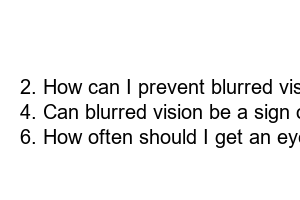시야가 흐려지는 현상
Blurred vision is a common problem that many people experience at some point in their lives. It can be caused by a variety of factors, such as eye strain, dry eyes, or certain medical conditions. In this blog post, we will discuss the causes of blurred vision, how it can be treated, and when to seek medical help.
**Causes of Blurred Vision**
Blurred vision can be caused by a number of factors, including eye strain, dry eyes, and certain medical conditions like diabetes or glaucoma. It can also be a side effect of certain medications or a symptom of a more serious eye condition.
**Symptoms to Watch For**
If you are experiencing blurred vision along with other symptoms like eye pain, headaches, or double vision, it is important to see a doctor. These could be signs of a more serious underlying condition that requires medical attention.
**Treatment Options**
Treatment for blurred vision will depend on the underlying cause. This could include prescription eyeglasses or contact lenses, eye drops for dry eyes, or medication for conditions like diabetes or glaucoma. In some cases, surgery may be necessary to correct the issue.
**Prevention Tips**
To prevent blurred vision, it is important to take care of your eyes by taking breaks from screens, wearing protective eyewear when necessary, and getting regular eye exams. Eating a healthy diet rich in nutrients like vitamins A and E can also help keep your eyes healthy.
**When to Seek Medical Help**
If you are experiencing persistent blurred vision that does not improve with rest or home remedies, it is important to see a doctor. This could be a sign of a more serious eye condition that requires prompt treatment.
**Summary**
In conclusion, blurred vision can be a common problem that is often easily treatable. By understanding the causes of blurred vision, recognizing the symptoms, and seeking medical help when necessary, you can take steps to improve your eye health and vision.
**FAQs**
1. What are some common causes of blurred vision?
2. How can I prevent blurred vision?
3. When should I see a doctor for blurred vision?
4. Can blurred vision be a sign of a serious medical condition?
5. What are some treatment options for blurred vision?
6. How often should I get an eye exam to check for blurred vision?

